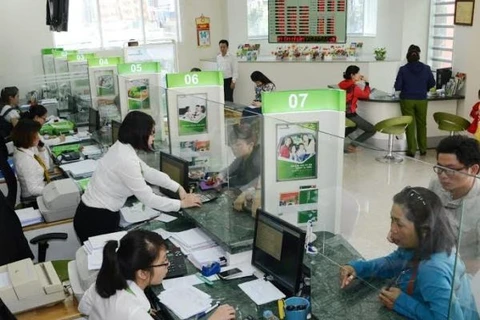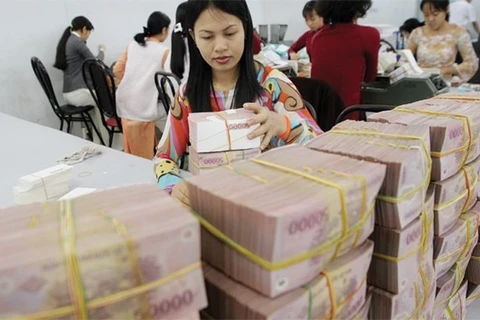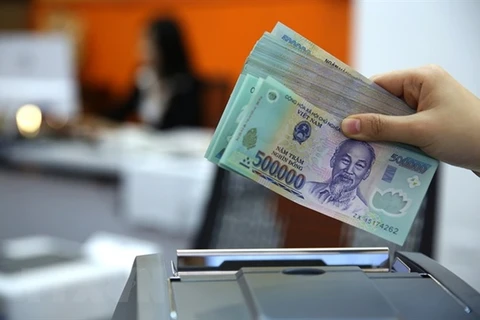Hanoi (VNA) – The ratio of bad debts in the domestic banking system will be dropped below 3 percent by the end of 2020, making contribution to restructuring the macroeconomic policy, Deputy Prime Minister Vuong Dinh Hue has said.
He made the statement while attending a teleconference in Hanoi on October 15 to review two-year implementation of the National Assembly’s No.42/2017/QH14 on the pilot settlement of bad debts of credit institutions, and the Prime Minister’s Decision No.1058/QD-TTg on approving a project on restructuring credit institutions in association with dealing bad debts for the 2016-2020 period.
“All credit institutions must be abided by legal regulations in bad debt settlement, work to ensure capital safety, and promote accountability to the State and community”, he stressed.
Nearly 10 trillion VND in non-performing loans settled each month
The State Bank of Vietnam (SBV) said that as of August 31, 2019, the banking system resolved around 236.8 trillion VND (10.2 billion USD) in non-performing loans since the Resolution No. 42 took effect on August 15, 2017. In average, some 9.6 trillion VND was settled each month, as compared to 4.78 trillion VND recorded during 2012-2017.
SBV Deputy Governor Nguyen Kim Anh said that Resolution No.42 and Decision No.1058 have created a positive change in settling bad debts and restructuring credit institutions, contributing to realising banking development targets in the time ahead.
Vietcombank General Director Pham Quang Dung said that Resolution No.42 has created an important legal framework for the whole banking system, helping his bank increase the amount of off-balance sheet liabilities to around 3.2 trillion VND, up 56 percent from the previous years.
“We do expect that the Resolution will be implemented regularly, not just on a trial period”, he said.
Bottlenecks need to be tackled
Despite positive results in the bad debt settlement, experts at the conference admitted that the work has faced a number of barriers such as improving financial capacity of commercial banks, as well as policies and mechanisms to restructure poorly-performing state-owned banks.
Dung said although Resolution No.42 clearly stated principle on priority for obligation to pay debts secured by collateral, there is no detailed instruction from the General Department of Taxation and the Ministry of Finance on how to carry out such priority. As a result, businesses need to complete all tax obligations before other procedures relating to handing over of land use rights and asset ownership rights.
“We are waiting for a detailed document from the General Department of Taxation so that all principles set in Resolution No.42 will be well implemented”, he said.
Meanwhile, Agribank Deputy General Director Pham Toan Vuong said the bank experienced loss as the mortgaged assets could not be transferred. Vuong attributed this to difference auction measures applied by tax agencies and localities.
Further inspections required
Deputy Prime Minister Vuong Dinh Hue described Resolution No.42 and Decision No.1058 as a milestone in bad debt settlement in tandem with restructuring of credit institutions.
“Resolution No.42 helps promote responsibility of credit institutions in handling bad debts. Currently, there are 11 commercial banks meeting Basel 2 standard, and many others free of bad debts at the Vietnam Asset Management Company (VAMC),” he said.
He expressed his belief that the bad debt ratio will be reduced below 3 percent by the end of 2020, fulfilling requirements of the Prime Minister as well as contributing to restructuring credit institutions and other macro-economic policies.
He asked the SBV to accelerate approval for restructuring projects for the remaining commercial banks, and join hands with competent sectors and ministries to complete solutions to acquiring weak banks.
It is important for the bank to build collateral asset database as well as improve efficiency of inspection in order to avoid new bad debts.
The SBV leader affirmed that the central bank will work with relevant ministries to seek measures to increase capital at state-owned commercial banks.
Focus will be given to outlining restructuring measures for several commercial banks based on existing regulations.
Furthermore, it will direct credit institutions to classify types of debts, set up risk provisions, and accelerate the settlement of bad debts, among others, he added./.

























